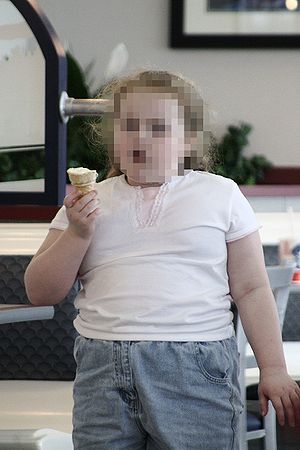 Image via WikipediaUnfortunately, childhood obesity is a significant problem, and it is not only a condition that affects the childhood of the obese individual. Being obese as a child increases your risk for heart conditions in adulthood. In fact, obesity in children has been called a warning sign of heart disease.
Image via WikipediaUnfortunately, childhood obesity is a significant problem, and it is not only a condition that affects the childhood of the obese individual. Being obese as a child increases your risk for heart conditions in adulthood. In fact, obesity in children has been called a warning sign of heart disease.According to the Centers for Disease Control and Prevention (CDCP), 16 percent of children between the ages of 2 and 19 meet the criteria for obesity. And while new cases of obese children are not necessarily growing, the number of children with diabetes is growing. This may well be a result of the childhood obesity epidemic.
In one study, artery wall thickness in obese children and teens was found to be as thick as the artery walls of a 45-year-old adult. This means that childhood obesity could have a sort of acceleration effect on heart disease. While the study was not conclusive and the number of participants was small, it does raise a certain red flag of concern. Also, the arteries of obese children may be in the first stages of atherosclerosis, which is the artery-hardening process that leads to stroke and heart attack. A study in Austria found that some obese children have enlarged hearts.
Pediatricians and other experts are concerned about the fact that these obesity-specific problems are occurring in such young people, who are still undergoing growth and development. Their systems are still being "fine-tuned," and having heart and obesity problems at such a young age means there is more time for the fat to do its damaging work. In other words, heart disease gets an earlier start on its damaging effects in the body.
High blood pressure is another concern in obese children, especially those children who have a family history of high blood pressure.
 Image via WikipediaAnother concern about childhood obesity is the number of fat cells in the body. Once you become an adult, the number of fat cells you have in your body does not change; they simply get bigger or smaller as you lose weight. The number of fat cells is still being determined in childhood, so an obese child is being set up to have weight problems for the rest of his or her life.
Image via WikipediaAnother concern about childhood obesity is the number of fat cells in the body. Once you become an adult, the number of fat cells you have in your body does not change; they simply get bigger or smaller as you lose weight. The number of fat cells is still being determined in childhood, so an obese child is being set up to have weight problems for the rest of his or her life.Thankfully, there are plenty of things you can do to prevent and treat obesity in your child. First, lower the saturated fat your child eats. Hot dogs, processed lunch meats, transfats, and other artificial fats and processed oils should be sharply limited. Avoid empty calories such as those found in packaged cakes, cookies, and other sugar-rich and nutrient-deficient foods. Fast foods should be completely eliminated from the child's diet.
Encourage your child to eat a lot of whole foods - brown rice, whole grain bread (preferably homemade), and fresh produce of all sorts. Nuts, while high in fat, make healthy snacks that help your child feel full. Let your child have treats in the form of homemade sweets that do not have a lot of refined sugar or fat (such as natural fruit leather). (For some recipe ideas, visit our Cooking From Scratch blog.)
And last but certainly not least, don't forget exercise! Kids should run around in the fresh air as much as possible on a daily basis. Encourage outdoor play, sports, biking, hiking, or other activity. Get the family in on the program, too, and set a good example for your children - it will prove beneficial for both you and them!

No comments:
Post a Comment